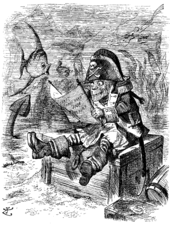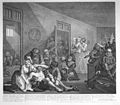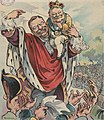Portal:Cartoon
The Cartoon Portal

A cartoon is a type of visual art that is typically drawn, frequently animated, in an unrealistic or semi-realistic style. The specific meaning has evolved, but the modern usage usually refers to either: an image or series of images intended for satire, caricature, or humor; or a motion picture that relies on a sequence of illustrations for its animation. Someone who creates cartoons in the first sense is called a cartoonist, and in the second sense they are usually called an animator.
The concept originated in the Middle Ages, and first described a preparatory drawing for a piece of art, such as a painting, fresco, tapestry, or stained glass window. In the 19th century, beginning in Punch magazine in 1843, cartoon came to refer – ironically at first – to humorous artworks in magazines and newspapers. Then it also was used for political cartoons and comic strips. When the medium developed, in the early 20th century, it began to refer to animated films that resembled print cartoons. (Full article...)

In print media, a cartoon is a drawing or series of drawings, usually humorous in intent. This usage dates from 1843, when Punch magazine applied the term to satirical drawings in its pages,[1] particularly sketches by John Leech.[2] The first of these parodied the preparatory cartoons for grand historical frescoes in the then-new Palace of Westminster in London.[3]

Selected article -
"A Rugrats Chanukah" is a special episode of Nickelodeon's animated television series Rugrats. The first episode of the show's fourth season, it tells the story of the Jewish holiday Chanukah through the eyes of the Rugrats, who imagine themselves as the main characters. The idea of a Rugrats Chanukah special was pitched by Nickelodeon executives in 1992, but the concept was revised and became the 1995 special, "A Rugrats Passover". After production of the Passover episode wrapped, the crew returned to the Chanukah idea. Nickelodeon broadcast "A Rugrats Chanukah" on December 4, 1996; the episode received a Nielsen rating of 7.9 and positive reviews from television critics. Along with other Rugrats episodes featuring Grandpa Boris and his wife, the special attracted controversy when the Anti-Defamation League compared the character designs to anti-Semitic drawings from a 1930s Nazi newspaper.
Selected character -
Captain Marvel is a comic book superhero, originally published by Fawcett Comics and now owned by DC Comics. Created in 1939 by artist C.C. Beck and writer Bill Parker, the character first appeared in Whiz Comics #2 (Feb, 1940). With a premise that taps into adolescent fantasy, Captain Marvel is the alter ego of Billy Batson, a youth who works as a radio news reporter and was chosen to be a champion of good by the wizard Shazam. Whenever Billy speaks the wizard's name, he is instantly struck by a magic lightning bolt that transforms him into an adult superhero empowered with the abilities of six mythological figures. Several friends and family members, most notably Marvel Family cohorts Mary Marvel and Captain Marvel, Jr., can share Billy's power and become "Marvels" themselves. Hailed as "The World's Mightiest Mortal" in his adventures (and nicknamed "The Big Red Cheese" by archvillain Doctor Sivana, an epithet adopted by fans as a nickname for their hero), Captain Marvel was, based on sales, the most popular superhero of the 1940s, since the Captain Marvel Adventures comic book series sold more copies than Superman and other competing superhero books during the mid-1940s. Captain Marvel was also the first superhero to be adapted into film in 1941 (The Adventures of Captain Marvel). Fawcett ceased publishing Captain Marvel-related comics in 1953, dure in part to a copyright infringement suit from DC Comics alleging that Captain Marvel was an illegal infringement of Superman.
Did you know... -
- ...that William Hanna claimed that the Tom and Jerry character Jerry Mouse was named Jinx in his first appearance while Joseph Barbera claimed that the mouse went nameless?
- ...that Morning Funnies was a fruit-flavored breakfast cereal featuring comic strip characters including Dennis the Menace, Hägar the Horrible, and Funky Winkerbean on the box?
- ...that pixel artists are featured in an annual juried art show, "Into the Pixel", at the E3 trade show for computer and video game industries?
Selected list -
The Primetime Emmy Award for Outstanding Voice-Over Performance is a creative arts Emmy Award given out by the Academy of Television Arts and Sciences. It is awarded to a performer for an outstanding "continuing or single voice-over performance in a series or a special." Prior to 1992, voice-actors could be nominated for their performance in the live action acting categories. The award was first given in 1992 when six voice actors from The Simpsons shared the award. From 1992 to 2008, it was a juried award, so there were no nominations and there would be multiple or no recipients in one year. In 2009, the rules were changed to a category award, with five nominees. No winner was named in 1996 or 2007. Nine voice actors from The Simpsons have won a combined 14 Emmys. Of those, Dan Castellaneta has won four and Hank Azaria has won three. Ja'net Dubois won two for The PJs and Keith David won two for his narration of various documentaries. Voice actors from shows on Fox have won 17 of 27 awards.
General images -
Selected biography -
Billy West (born April 16, 1950) is an American voice actor. Born in Detroit but raised in the Roslindale neighborhood of Boston, Massachusetts, Billy launched his career in the early 1980s performing daily comedic routines on Boston's WBCN. He left the radio station to work on the short-lived revival of Beany and Cecil. He was also a writer and castmember on The Howard Stern Show during the early to mid 1990s, where he gained nationwide fame with his impersonations of Larry Fine and late Cincinnati Reds owner Marge Schott. West is best known for his voice-work on Ren & Stimpy, Doug and Futurama. His favorite characters are Philip J. Fry (Futurama) and Stimpy (Ren and Stimpy), both of which he originated. West's most notable film work was in Space Jam (1996) providing the voice of both Bugs Bunny and Elmer Fudd. He has provided the same voices for other Looney Tunes films and video games. West has been very outspoken over his displeasure about the influx of movie star actors providing voice-over for films and major shows. As well as a voice artist, West is also a guitarist and singer-songwriter with a band called Billy West and The Grief Counselors.
Subcategories
WikiProjects
- Main projects
- Arts • Animation • Comics • Entertainment • Visual arts
- Related Projects
- Anime and manga • Biography • Film • Fictional characters • Media franchises • Music • Television • Video games
Selected quote -
Topics
- Comic book
- Comic strip
- Digital comics
- Graphic novel
- Mobile comic
- Motion comics
- Trade paperback
- Webcomic
- Animator
- Animation director
- Animation studios
- Animation film festivals
- Feature-length films
- Short films
- Television series
- Computer-animated films
- Stop-motion films
- Traditional animation
- Limited animation
- Rotoscoping
- Stop Motion
- Clay
- Cutout
- Graphic
- Model
- Object
- Pixilation
- Puppetoon
- Computer animation
- Flash animation
- PowerPoint animation
- SVG animation
- Cel-shaded animation
- Crowd simulation
- Morph target animation
- Motion capture
- Non-photorealistic rendering
- Skeletal animation
Things you can do

- Requested articles: Fenwick (comics), Khimaera (comics), Mutant Underground Support Engine, Bruce J. Hawker, Marc Dacier, Hultrasson, Frankenstein Comics, Dave Johnson (comics), Paco Medina, Dappere Dodo, New Adventures of the Space Explorers, Habatales, Musical Box, Foo-Foo (TV series), Bonne nuit les petits, The Adventures of Lariat Sam, More...
- Images and photos needed: Request images that are needed from Wikipedia requested images of comics and animation to included in each articles.
- Stubs: Work on stubs in articles in Comics and Animation stubs.
- Infobox: Add infobox that are needed from Category:Comics articles without infoboxes and Category:Animation articles needing infoboxes in articles.
- Deletion sorting: Please see the collection of discussions on the deletion of articles related to comics and animation - compiled by WikiProject Deletion sorting
Related portals
Associated Wikimedia
The following Wikimedia Foundation sister projects provide more on this subject:
-
Commons
Free media repository -
Wikibooks
Free textbooks and manuals -
Wikidata
Free knowledge base -
Wikinews
Free-content news -
Wikiquote
Collection of quotations -
Wikisource
Free-content library -
Wikiversity
Free learning tools -
Wiktionary
Dictionary and thesaurus
More portals
Sources
- ^ Punch.co.uk. "History of the Cartoon". Archived from the original on 2007-11-11. Retrieved 2007-11-01.
- ^ Adler & Hill 2008, p. 30.
- ^ "Substance and Shadow: Original Editorial Accompanying "Cartoon, No. I"". Victorian web.org. Retrieved 29 October 2023.









































